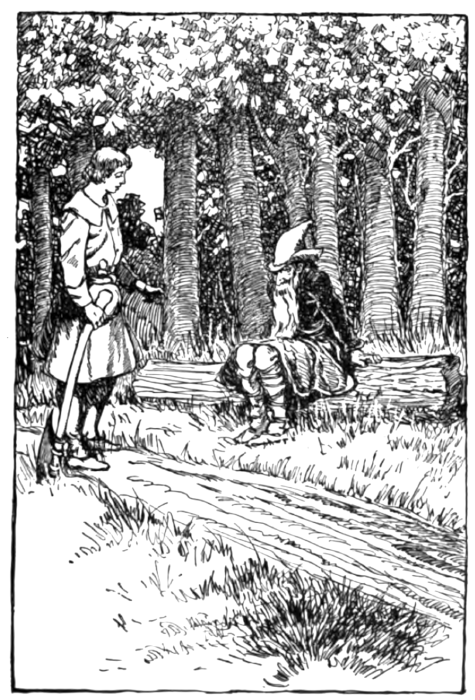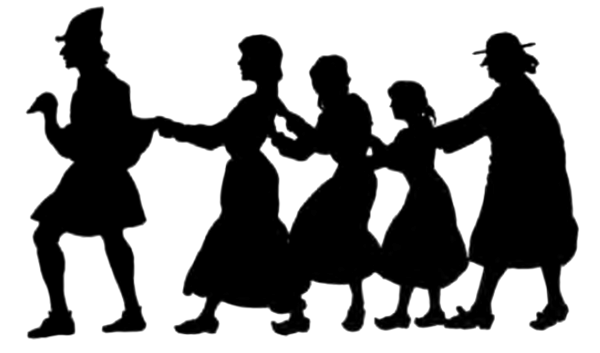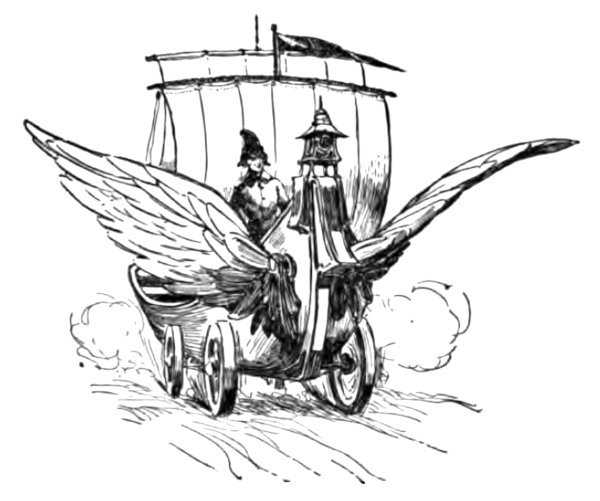| Web
and Book design,
Copyright, Kellscraft Studio 1999-2024
(Return
to Web
Text-ures)
| Click
Here to return to The Elm Tree Fairy Book Content Page Return to the Previous Chapter |
 (HOME)
|
|
THE
GOLDEN GOOSE
THERE was once a man who had three sons, the youngest of
whom was called "The Simpleton." He was a good lad enough, but people
thought he was not as clever as the other two, and so he was laughed at and
neglected. It happened one day that the oldest son wished to go to the
forest to cut wood, and his mother gave him a fine large pancake and a flask of
milk to carry for his lunch. As he was going along the forest road he met a
little, gray old man who wished him good day, and said, "Give me a piece
of your pancake and let me have a sip of your milk, for I am very hungry and
thirsty." But the prudent youth answered, "No, no, I have only
enough for myself," and walked on to the place where he intended to work. He began to hew down a tree, but he presently made a wrong
stroke and cut his foot. That obliged him to limp off home to get the wound
bound up and wait till the hurt was better. The next day the second son went into the forest, and he
carried with him a pancake and a flask of milk his mother gave him for his
lunch. Like his brother, he met the little, gray old man, and was asked for a
bit of the cake and a drink of the milk. But the lad spoke out plainly and
said, "What I give to you I cannot have for myself. Go take yourself
off." He left the little old man standing there, and went on to
where he intended to chop. Then he began work and kept at it till he cut a tree
off, but the tree in falling struck him on the shoulder, and so bruised him
that he did not think he would be able to chop any more for a week, and he
plodded off home.  The simpleton and the gray old man The next day the Simpleton said, "Father, it is my turn
to go into the forest to cut wood." "Nevertheless, you had better stay where you are,"
said his father, "Your brothers have both hurt themselves chopping, and
you would most likely fare even worse than they have." But the Simpleton kept urging until the father said, "Well,
then, go. You will only learn by experience." So the lad's mother gave him a piece of dry bread and a
flask of water for his lunch, and off he started. As he entered the forest the
little, gray old man met him and said, "Give me something to eat and a
drink out of your flask. I am very hungry and thirsty." "I have only a piece of dry bread and my flask contains
nothing but water," responded the Simpleton, "but if such fare is
good enough for you, let us sit down and lunch together." They sat down, and when the Simpleton took out his dry bread
he was astonished to find that it became a rich pancake, and the water in the
flask was transformed to the sweetest of milk. They ate and they drank, and
when they finished, the little man said, "Because you have a good heart
and have willingly shared what you had, I intend to bestow good luck on you.
Yonder stands an old tree. Cut it down, and at its roots you will find a golden
goose. Nobody can steal it from you, for whoever lays hands on it or on anyone
touching it cannot get their hands free except by your permission." So saying, the little man rose and walked quickly away into
the woods and disappeared. The Simpleton at once began to cut down the tree. It
had a hollow centre, and when it fell he found a goose sitting in this hollow
centre down among the roots. He lifted the goose out, and behold it had
feathers of pure gold. "Now," said the Simpleton, "my fortune is as
good as made, and I will go out into the world and see what shape my luck will
take." So he left his ax, took the goose under his arm, and off he
tramped. Toward evening he came to an inn where he stopped for the night. The
landlord had three daughters, and when they saw the goose they were curious to
know what wonderful kind of a bird it was. The Simpleton shut it up in al pen
behind the inn, and early the next morning the oldest daughter went out to have
another look at it. "I would like one of those feathers for myself,"
said she, "and, what is more, I will have one." She seized the goose by a wing, but her hand stuck fast and
she could neither pull out a feather nor get loose. Soon afterward the second
daughter came into the yard. "What are you doing with that goose?"
she asked. "I wanted to get one of its golden feathers,"
replied the other. "Well," said the second daughter, "I want
one, too. So let me have a chance." She put her hand on her sister to push her aside, and the
hand stuck and she could not remove it. Lastly, the third sister appeared, but
the other two screamed out, "Stay away! For heaven's sake, stay
away!" "No, I will not," she responded. "You are
pulling out golden feathers, and I must have some too."  Then she laid hold of the second sister to force her out of the
way, and her hands stuck and she could not get loose. Pretty soon the Simpleton came forth, took the goose under
his arm and walked away by a field path, paying no attention to the three girls
who, attached to each other and the goose, had to trot after him wherever he
went. They had not gone far when they met the parson. "Shame on you,
girls, running after a young fellow through the fields like this," said
he, and he seized hold of the youngest to drag her away, but the result was
that he too was obliged to run on with the rest. Shortly afterward
they met the sexton, who, seeing the respected parson following at the heels of
the three girls, called out, "Ho, your reverence, whither away so quickly?
You forget there is a funeral you must attend this day." But the parson kept trotting on, paying no attention to this
appeal, and the sexton, greatly amazed, grabbed his gown to detain him. Yet no
sooner did he touch the garment than he was compelled to follow the others, and
now there were five persons behind the Simpleton with his goose. By and by they
came to the town where the king reigned, and this king had an only daughter who
was so serious that she never even smiled. The king had proclaimed that any man
who could make her laugh should have her in marriage, and when the Simpleton
heard of this he at once went with his goose and his hangers-on into the
presence of the princess. As soon as she saw the strange' procession she burst
out laughing, and kept on laughing as if she would never stop. So the Simpleton earned a right to her as his bride, but the
king did not fancy him for a son-in-law, and made all kinds of objections.
Finally he said to the Simpleton, "You must first bring me a man who can
drink a whole hogshead of water at one draught." The Simpleton thought the little gray man might be able to
help him, and he returned to the forest. On the very spot where he felled the
tree he found a man sitting with a very sad countenance. "What is the
matter?" asked the Simpleton. "I have a terrible thirst," replied the man.
"Just before you came along I drank a pailful, but that only made me
thirstier." "Come with me," said the Simpleton, "and I
promise you shall have enough to satisfy you." They went to the city of the king and the man drank the
whole hogshead full of water as if it were no more than a pint. The Simpleton
then asked for his bride, but the king was annoyed that such a low-born fellow
should marry his daughter. So he made new conditions. The lad must first find a
man who could eat up a whole roomful of bread in a single day. The Simpleton did not hesitate long, but hastened back to
the forest. On the stump of the tree he had cut down sat a thin,
sorrowful-looking man with a strap fastened very tight around his body. "What
troubles you?" the Simpleton asked. "I am hungry," replied the man, making up a
horrible face. "I have just eaten a dozen loaves of bread, but my stomach
still seems quite empty, and I have strapped myself tightly that I may feel the
emptiness less." "Get up and go with me," said the Simpleton,
"and your hunger shall be relieved." They went straight to the king's city where a room full of
bread was ready, and it was a large room, too. But the man from the forest
settled himself to eat, and in a day's time the bread had all disappeared, and
he did not need to wear the strap about his body any longer. Then the Simpleton asked for his bride the third time. The
king, however, said he should not have her until he brought him a ship that
could sail on both water and land. "There shall be no more delays,"
be promised. "As soon as you come sailing along with such a ship as I have
asked for, you shall have my daughter for your wife."  The Simpleton once more resorted to the forest, and there on
the stump of the hollow tree sat the little, gray old man with whom he had
shared his lunch. "It was I," said the little man, "who sent the
fellow that drank the hogshead of water, and I also sent the man that ate the
room full of bread, and now I will give you a magic ship that will sail on land
or water. All this I do because you were kind to me." He then tapped the hollow of the stump with a staff he carried, and forth came a beautiful ship with wings above and wheels below. The Simpleton got into it and away it went over the land, and when there was a stream to cross it went equally well through the water. Presently it arrived at the royal city, and the king saw that it was just the kind of ship he had demanded. He made no further attempt to withhold his daughter, and the wedding took place the next day. In the course of time the old king died, and the Simpleton ruled in his stead and lived long and happily. |